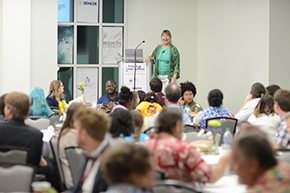 October 10, 2017 (Jackson, Miss.) - STEM educators from universities and schools across Mississippi discovered new ways to strengthen their teaching efforts at the first-ever Mississippi STEM Education Symposium: Issues and Innovations.
October 10, 2017 (Jackson, Miss.) - STEM educators from universities and schools across Mississippi discovered new ways to strengthen their teaching efforts at the first-ever Mississippi STEM Education Symposium: Issues and Innovations.
Some of the top professors in the country, who are members of Science Education for New Civic Engagements and Responsibilities (SENCER), spoke to Mississippi educators about current innovations and best practices. Speakers shared ways to effectively teach science through the lens of stewardship, civic engagement, and social responsibility.Belhaven's Division of Science and Mathematics organized and hosted the all-day event on Friday, September 29 in the University's Dr. Billy Kim International Center.
“This was a great opportunity for the STEM education community in Mississippi to engage in meaningful conversations about how to better teach and promote science disciplines,” said Dr. Reid Bishop, professor and chair of chemistry and division chair of science and mathematics at Belhaven.
Educators and student leadership from Mississippi State University, University of Mississippi, Belhaven University, Millsaps College, University of Southern Mississippi, Mississippi College, Hinds Community College, Jackson State University, and others were in attendance. K-12 teachers from around the state also participated in the special conference and gained helpful information they plan on using in their classrooms.
“Educators need and ask for practical ideas that they can use for their students, either in research or in the classroom,” said, Dr. Catherine Middlecamp, dean of arts and sciences at University of Wisconsin at Madison and keynote speaker. “Educators need inspiration and this conference brought together many different people in science, technology, engineering and mathematics to share innovations, work through issues and ultimately strengthen STEM.”
Organizers wanted to showcase ideas that get students excited about science, and Dr. Garon Smith, chemistry professor at University of Montana, demonstrated how he uses entertaining wizard shows to teach STEM concepts.
“We want to learn from the best science educators in the country about how to effectively teach science,” Dr. Bishop added. “We want to take the lessons we learned at this event and apply them to our work with students. Every one of us plays an important part in strengthening STEM and as educators, we are uniquely poised to guide the discussion on how to better connect our students to the study of the sciences.”
